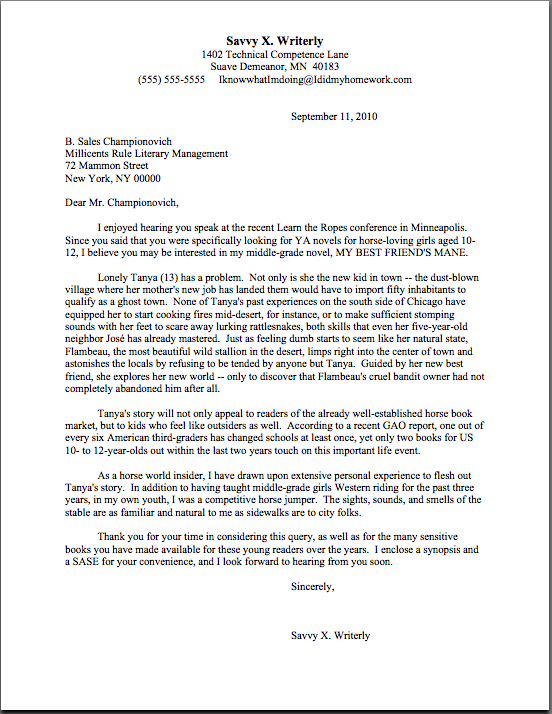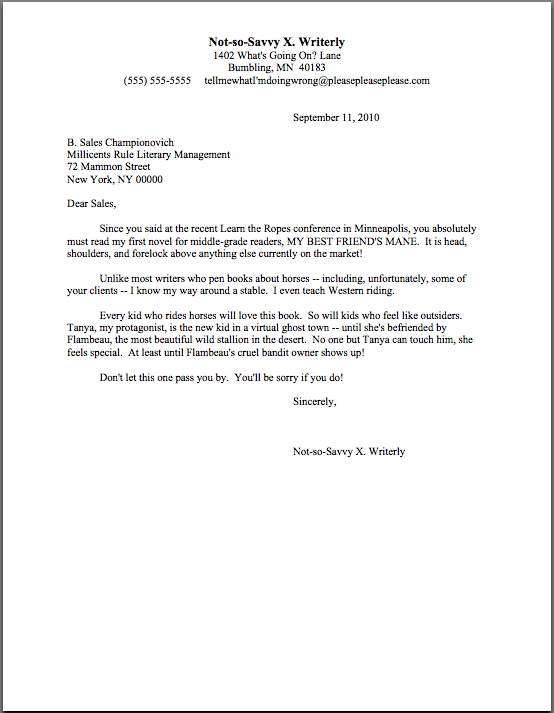
“What?” those of you who have been following Queryfest lo! these many weeks cry in astonishment. “Another post on how to put together a query letter? Surely, by now, we’ve covered the basics?”
The basics, yes. The finesse, not entirely. Bear with me here.
As those of you stalwart souls who have been following this long, in-depth, and (my apologies) sporadically posted series are, I hope, acutely aware, it’s a matter of great astonishment to those of us who work with manuscripts for a living how often reasonable professional advice to aspiring writers (or, even more often, an agent’s offhand comment about a personal preference) becomes transformed through the magic of third-through-hundredth repetition into a purported Cosmic Law of Querying that bears only a faint familial resemblance to the original advice. Apparently, nowhere is the potent equation specific statement + word of mouth + time = distortion more operational than in the word-of-mouth paradise that is the aspiring writers’ community.
That has been true since Jane Austen’s time, certainly — the next time a long turn-around time on requested materials frustrates you, you might want to refresh your spirit by reading up on her publisher’s sitting on her first book for years on end, leaving her to guess why — but the speed and frequency with which sensible advice can mutate has risen astronomically in recent years. Not entirely surprising, when Internet searches are so gifted at ripping individual statements out of context, communications are so rapid — and far, far too many people believe, mistakenly, that if they saw something online, it must be true..
Now, to paraphrase Mark Twain, a misconception can make it halfway around the world before the truth has a chance to get its boots on. And because of the astonishingly pervasive belief in the Internet Truth Fairy, the winsome pixie that flits from site to site, waving her magic wand over misstatements, misapprehensions, and outright lies and transforming them into the purest of driven truths, well-meaning writers all over the country — nay, the world — end up following advice not only at odds with the original advisor’s intention, but sometimes even diametrically opposed to it.
How does that happen, you ask, wide-eyed? Good question.
Do you recall how careful I was in my recent post on platform paragraph construction to assure all of you that the examples I was using were fictional, and thus should not be cited anywhere, anytime, as fact? Thought I was being a tad pedantic, didn’t you?
I had good reason: in last year’s foray into the mysteries of query-writing, I woke one drizzly Seattle a.m., to find an incoming link from the University of Bonn.
Why? Because my post the previous evening had contained the following totally made-up statement: Audrey Hepburn holds an earned doctorate in particle physics from the University of Bonn, and thus is eminently qualified to write on atomic bombs.
Now, to the best of my knowledge, this is not historically true; I said in the post that it was not true. But did the web bot searching for the phrase University of Bonn trouble itself with fact-checking? Or with context?
The moral: Don’t believe everything you read on the Internet. Even if you read it here. Or heard someone say that they might have heard it here.
I hope I shan’t shatter anybody’s cherished illusions about the ITF, but there’s quite a bit of query-construction advice floating around out there on the Internet, and not all of it is particularly helpful. Partially, that’s a function of lack of term definition: just as standard format for book manuscripts and proper formatting for short stories differ in many ways (yes, really), yet few websites professing to tell writers how their work should appear on the page mention those important distinctions, a query to an agent seeking representation for a book, a query to a magazine to try to place an article, and a query to someone outside of the publishing industry would all call for different approaches.
Self-evident as soon as you hear it broken down that way, right? Each would require different information; the recipients would expect different styles. Even what would constitute a polite tone would vary, depending upon destination.
All of that screaming echoing out there in the ether is emitting, I presume, from the many, many aspiring writers out there who launched their efforts to get published by plugging query letter into a search engine and reading the top five results. Or the top fifty. As many of you have no doubt discovered to your chagrin, not only is every self-styled expert not recommending the same strategies; often, the advice is contradictory. And that tends to come as a big, nasty surprise to the legions of aspiring writers out there who believe, all practical evidence to the contrary, that the publishing riddle is so easy to crack that a one-minute Google search and ten minutes of reading will provide every scintilla of guidance necessary to land an agent.
Not to mention those who firmly cling to a belief in the ITF’s error-reducing wand.
To whom I say: please read with care, and never follow querying advice if you don’t completely understand how to implement it and how implementing it will help you. Be wary of any self-styled sure-fire boilerplates: in an industry devoted to celebrating individual authorial voices, aspiring writers are expected to come up with queries that don’t sound exactly like everyone else’s.
And don’t be afraid to ask follow-up questions. In these days of slashed budgets, even the best-intentioned fairy godmothers sometimes fall down on the job.
Case in point: earlier in these series, I wrote at length — yes, yes, I know: that qualifier doesn’t narrow it down much — about how narrative voice does and does not play a role in a strong query letter. Yet even as my much-beleaguered fingertips were typing a spirited defense of a narrative paragraph that tells the book’s story, rather then just discussing it the way one might in an English term paper, I found myself murmuring, “You know, I’ve been talking about each of the requisite elements of a query — as well as a couple that are merely helpful and stylish to include — as if they were building blocks: stack ‘em up, and you have yourself a query. I’m pretty sure that we’ve covered the constituent parts sufficiently, but have I given enough examples of how those parts fit together into a harmonious whole?”
Well might I mutter. Although the overall impression a careful reader might derive from Queryfest is a coherent whole, we’ve mostly been talking about individual parts, paragraphs, or even sentences, have we not? For those of you new to the querying process, I imagine it’s been sort of like my asking you to form a mental picture of a beach, not by flashing you the photograph at the top of this post, but by showing you the same space chopped up like this:



It’s not that any of these close-ups are inaccurate, per se (although that last shot of the boulder has some perspective problems), but even viewed all together, they don’t give the full picture. This evening, I would like to rectify that by simply overwhelming you with examples of entire query letters.
Yes, in response to what half of you just shouted: I, a writer, am voluntarily going to sit down and write not only one query letter tonight, but several, back to back. And I’m not going to be driven insane by stress in the process. Heck, I’ll probably even enjoy it.
And the masses swoon. “How is this miracle possible?” you cry. “Is not querying a migraine-inducing, fingernail-gnawing, soul-sucking process by definition? How might a sane creative person run this gauntlet and emerge unscathed?”
Come closer, and I’ll let you in on a little professional writers’ secret: querying gets easier with practice. Once you get the hang of the logic behind it and learn to describe a book in professional terms, it actually isn’t all that hard.
That’s why, in case you’d been wondering, agents, editors, and even already-agented writers tend to give querying advice as if a show-stopping query were something any truly talented writer could toss off in 15 minutes flat. They’re not being insensitive to the difficulties facing the aspiring writer intimidated by the querying process; they’ve just forgotten what it’s like to do it for the first time. Or the incredible courage required for someone who knows nothing about such a letter other than the fact that he cannot land an agent without it to take pen in hand and even begin a draft, much less send it.
No, the fine folks who read these things for a living must, in self-defense, get inured to the difficulties. Given what a high percentage of even rather interesting-sounding queries Millicent must reject, she must come to accept the industry truism that a more polished, professional-looking query is a pretty good indicator of an aspiring writer who has been plugging away at if for a while.
Oh, you may groan, but there’s a reason they believe it: just as most submitters do not present their manuscripts in standard format the first time they send off requested materials, for the simple reason that they have not been hanging around the publishing world long enough to know that in the U.S., agents submit their clients’ work to editors in a specific format (which you will find laid out at length under the HOW TO FORMAT A BOOK MANUSCRIPT category on the archive list at right, should these repeated references be making you a bit nervous), most eventually successful queriers send out at least a few awkward, incomplete, or downright inadequate queries early in their drive to get published. There’s nothing like rejection, after all, to make a writer question whether his query is doing the job.
So to the pros, believe it or not, rejection doesn’t always represent a final refusal to consider a writer’s work; it can be a necessary and even helpful part of a good writer’s training.
Which is to say: query-writing gets easier with practice. At least it does if you understand what’s supposed to go into the darned thing.
Let’s recap what’s absolutely required in a query letter, and what merely advisable to mention. Here are the absolutely indispensable elements of a successful query letter. Without each and every one, rejection is more or less inevitable.
1. The book’s title
2. The book’s category, expressed in existing category terms
3. A brief statement about why you are approaching this particular agent
4. A descriptive paragraph or two, giving a compelling foretaste of the premise, plot, and/or argument of the book, ideally in a voice similar to the narrative.
5. An EXTREMELY brief closing paragraph thanking the agent for considering the project.
6. A SASE, if querying by mail.
Stop kicking yourselves and wailing, those of you who realized that you have in the past sent out letters with one or more of these rudiments missing. Practically everyone does that at first; see comment above re: it getting easier with practice. Those dark days are behind you now.
What makes me so sure of that, you ask? Because you’re never going to forget to include each and every one of these essential bits of information in a query letter again, right?
Heck, you’re even going to get fancy and include some not -strictly-required elements that Millicent the agency screener generally enjoys seeing in a query:
7. A brief marketing paragraph explaining for whom you have written this book and why this book might appeal to that demographic in a way that no other book currently on the market does.
8. A platform paragraph giving your writing credentials and/or expertise that renders you the ideal person to have written this book.
You also know — and this is going to place you miles ahead of a startlingly broad swathe of the aspiring writer population — what all of these building blocks are supposed to look like once they’re assembled into a building. A little something like the following , to be precise (and my apologies in advance if the images here come out a trifle fuzzy; if they do, try enlarging them by holding down the COMMAND key and pressing + several times):

See? A place for everything, and everything in its place.
But what happens if the various elements don’t appear more or less in the expected order, or if the tone is not professionally respectful? Great questions. Let’s take a peek at the same book with the same selling points, not presented nearly so well.

I like to call this the Good Query Gone Bad. It contains all the basic elements (although not done very well); the querier has clearly given some thought to the market appeal of his book (but not presented the results very convincingly); the story itself sounds rather interesting (despite being poorly described). It is, in fact, what many aspiring writers confused by conflicting querying advice produce, the basic notes of the query strung together without getting the tune quite right.
“But isn’t that close enough?” thousands of you ask, tears welling up in your frustrated eyes. “This second letter is a trifle vague, perhaps, and rather pushy at the end, but Millicent couldn’t be in serious doubt regarding what this book is about, could she? Why wouldn’t she give it the benefit of the doubt?”
A pretty good reason, actually: in these days of shrinking agency support staffs, she and her boss cannot read every vaguely-described manuscript that might be interesting and well-written. And in the current literary environment, in which — correct me if I am wrong, long-time readers — thousands upon thousands of very talented writers have spent years upon years learning the ropes of writing a query letter, why wouldn’t she automatically prefer the first example over the second?
The book being presented is the same, but admit it: it sounds more interesting in the first query, does it not? Not to mention coming across as the work of a more experienced writer. If that’s not enough to sway you as you step reluctantly into Millicent’s shoes, consider: which writer would you expect to be more work for the agency to take on as a client, the first or the second?
Uh-huh. Remember, it’s not as though Millicent’s boss can afford to take on every promising writer who queries with an intriguing story: it’s rare that an established agent with an active client list takes on more than three or four new books per year. Considering that agent’s Millicent might easily screen somewhere between 800 and 1500 queries per week, can you really blame her for being exceptionally picky?
I sense some furrowed brows out there. “But Anne,” brow-knitters across the land protest, “even recognizing the exceedingly high level of competition at the querying stage — which, incidentally, strikes me as an unfairly high barrier for a new writer to be expected to hurdle — this second version looks okay to me. Not nearly as good as the first one, of course, but still, it does everything I’ve always heard a query needs to do. The tone may not be professional, but it’s hardly insulting, and you said yourself that the plot still sounds interesting. So mightn’t it get past a Millicent who happens to be in a good mood?”
Well, I suppose it might, furrowers — but do you have any idea how mood-deflating reading a hundred queries before lunch can be?
And this is one of the better ones. Also one of the more polite, believe it or not. Now do you want to risk taking your chances on Millie’s mood saving this one, Savvy?
You’re quite right, though, furrowers, that the tone problems here are subtle, so much so that someone who has never seen a professionally-phrased query letter before might not catch the difference. So let’s put some of those skills we all learned in our English classes to good use and do a solid, old-fashioned compare-and-contrast exercise, shall we?
I shall take that multi-part chorus of moans for a resounding affirmative. Let’s go through our list of required elements one by one, to see what a difference attitude and thoroughness make.
The book’s title: both include that in the first paragraph, check.
The book category: again, check, in both versions. But take a peek at how differently this information is conveyed:
Good example: Since you said that you were specifically looking for YA novels for horse-loving girls aged 10-12, I believe you may be interested in my middle-grade novel.
Gone Bad example: Since you said…you absolutely must read my first novel for middle-grade readers
Not nearly so specific, is it? Yes, middle-grade novel is a legitimate book category, but it’s awfully broad. By giving some indication of what sub-segment of the immense and complex middle-grade market the book is aimed, Savvy does a better job at presenting the book’s market niche.
And call me old fashioned, but I don’t approve of people asking favors giving orders: while I believe you may be interested in is polite speculation, you absolutely must read implies that the agent has no choice in the matter. From orders, Not-so-Savvy escalates by the end of the letter to threats:
Gone Bad example: Don’t let this one pass you by. You’ll be sorry if you do!
Excuse me? I’m quite positive that Not-so-Savvy’s mother, dear old white-haired Mrs. Writerly, cannot know that her offspring is communicating this way with strangers — and strangers he wants to help him, no less. It would break her long-suffering heart.
So let’s not tell her, okay? Or about that nasty little dig at the writers Mr. Championovich has represented in the past.
And what do you suppose is the point of Not-so-Savvy’s going out of his way to mention that this is my first novel for middle-grade readers? How could that possibly be relevant to Millicent’s decision whether she believes this book might interest Mr. Championovich? Unless the query went on to mention previous publications in other book categories, whether this was Not-so-Savvy’s first attempt to write a YA book or his 47th wouldn’t really weigh into her decision.
There’s another reason to avoid including this information in a query. As important as the fact of having written a first novel (as opposed to, say, a third) might be to the writer, all including this information in the query tells an agency inhabitant is that the writer isn’t very experienced — not the best impression to convey, as I mentioned above.
Can’t you think of better ways for a querier to use that precious page space? How about working in another of our required elements?
A brief statement about why you are approaching this particular agent: again, check on both counts.
But again, note the differential in tone:
Good example: I enjoyed hearing you speak at the recent Learn the Ropes conference in Minneapolis. Since you said that you were specifically looking for YA novels for horse-loving girls…the many sensitive books you have made available for these young readers over the years.
Ah, you hadn’t thought of that bit in the last paragraph as being part of the why me? explanation, had you? To Millicent’s eye, it is: it implied that the Savvy has gone to the trouble of finding out what her boss has represented in the past.
Compare the graceful ingratiation of that, please, with our other exemplar’s efforts to explain why he had approached this particular agent:
Gone Bad example: Since you said at the recent Learn the Ropes conference in Minneapolis…
Um, since he said what? Actually, this was an honest-to-goodness typo in my hastily-constructed example, but as it’s an extremely common species of typo, I didn’t correct it.
Did you catch it the first time? Millicent would have.
Had I reminded you lately to proofread every query every time? While you are ruminating on that excellent precept, let’s continue down our list.
A descriptive paragraph: as a professional reader, I think there’s no comparison between the two queries on this point: the first tells the story via vivid details by focusing on characterization; the second just summarizes the plot.
Admittedly, though, it still makes the story sound exciting. Most queriers would actually be quite pleased if they could be simultaneously this pithy and this entertaining in their descriptive paragraphs.
The glitch in the second is really the result of where this information falls in the letter. See if you can spot the problem in the third paragraph:
Gone Bad example: Every kid who rides horses will love this book. So will kids who feel like outsiders. Tanya, my protagonist, is the new kid in a virtual ghost town — until she’s befriended by Flambeau, the most beautiful wild stallion in the desert. No one but Tanya can touch him, she feels special. At least until Flambeau’s cruel bandit owner shows up!
Comes rather late in the paragraph, doesn’t it? Especially for a piece of writing intended for eyes notorious for skimming queries very quickly.
In journalism, this is called burying the lead. It’s a good story — so why hide its merits in the middle of a paragraph about something else entirely?
Starting to get the hang of this? Excellent. Let’s move on.
A brief marketing paragraph explaining for whom you have written this book and why this book might appeal to that demographic : this is perhaps where the strongest contrast between the two lies. Gone Bad’s rendition is far and away the more common in actual queries.
Good example: Tanya’s story will not only appeal to readers of the already well-established horse book market, but to kids who feel like outsiders as well. According to a recent GAO report, one out of every six American third-graders has changed schools at least once, yet only two books for US 10- to 12-year-olds out within the last two years touch on this important life event.
“Swoon!” Millicent murmurs. “A novelist who knows how to do market research! And I’d had no idea how often elementary schoolers move. That’s definitely a large niche market.”
I’d had no idea, either, Millicent, until I conducted a 2-minute web search while I was writing Savvy’s query. Startling, isn’t it? (The fact that they move so much, I mean, not that I was able to turn up an apt statistic that fast. I do have a Ph.D., you know; I’m trained for this stuff.)
Gone Bad example: It is head, shoulders, and forelock above anything else currently on the market! … Unlike most writers who pen books about horses — including, unfortunately, some of your clients — I know my way around a stable… Every kid who rides horses will love this book. So will kids who feel like outsiders.
Okay, so the joke in the first sentence is actually rather funny (if I do say so myself), but what a lot of unsubstantiated claims in a row! Even if they are true, why should Millicent believe them without any corroboration?
It’s starting to be hard to remember that these two queries were for the same book, isn’t it?
A platform paragraph: admittedly, both queries do make the writer sound quite knowledgeable about horses. However, Not-so-Savvy has forgotten his single best credential for writing on this particular subject for this particular audience. See if you can spot his unfortunate omission.
Good example: As a horse world insider, I have drawn upon extensive personal experience to flesh out Tanya’s story. In addition to having taught middle-grade girls Western riding for the past three years, in my own youth, I was a competitive horse jumper. The sights, sounds, and smells of the stable are as familiar and natural to me as sidewalks are to city folks..
Gone Bad example: Unlike most writers who pen books about horses — including, unfortunately, some of your clients — I know my way around a stable. I even teach Western riding.
Did you catch it this time? Even setting aside the rather nasty tone of the opening sentence, can you justify his having left out the information that he has been teaching readers in his target demographic to ride their beloved horses for three years?
Oh, Not-So. I’m genuinely worried about your self-esteem. If you don’t tell Millicent about your book’s selling points, she’s not going to know about them. Is that honestly the best strategy for convincing her that her boss should take a chance on your novel?
A closing paragraph thanking the agent for considering the project: hoo boy. Try not to avert your eyes from the disastrous contrast you are about to see.
Good example: Thank you for your time in considering this query, as well as for the many sensitive books you have made available for these young readers over the years. I enclose a synopsis and a SASE for your convenience, and I look forward to hearing from you soon.
Gone Bad example: Don’t let this one pass you by. You’ll be sorry if you do!
Even I feel like averting my eyes from that last one — which is a quote fed to me by an agent who prefers to remain nameless, by the way. She wanted to get the word out that she would prefer, on the whole, never to see this arrangement of words on a query page again.
If it’s all the same to you, queriers. Which I’m betting it will be, now that you have seen first-hand just how rude ostensibly upbeat hard-sell statements like this look in a query.
Makes quite a difference, knowing how a professional screener might view things, eh? Starting to feel more comfortable navigating those ropes by yourself without a net?
I had planned to stuff a few more positive examples into this post, but frankly, proving so thoroughly that the same book can be queried so differently using precisely the same selling points has depressed me into a stupor. I’m sure I’ll rouse myself for another example-heavy post later this week.
But before I sign off, one more thing: remember how I mentioned at the top of this post that agents, editors, and already-agented writers often take it for granted that an aspiring writer really serious about getting into the biz would have done sufficient homework to toss off a query as solid as Savvy’s in 15 minutes flat?
It took me a grand total of 5 minutes to write both of today’s examples in their entirety. Yes, counting those two minutes of web research.
That’s the result of practice, my friends. That, and knowing precisely what Millicent wants to see in a query. Once a writer understands that the only trick here is figuring out how to present her book in those terms, the actual writing of the darned thing can be downright speedy.
Trust me on this one; I’m a doctor. Book doctor, that is. Keep up the good work!
Hallu, Annie!
Please come on over and share the BIG news with me at: http://kateevangelistarandr.blogspot.com/2011/12/news.html
I hope to see you there.
Sincerely,
Kate
KATE! This is completely fabulous in every way! I’m so proud of you!
And I’m looking forward to announcing the release!